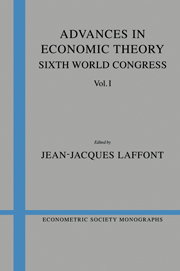Book contents
- Frontmatter
- 1 Foundations of game theory
- 2 Refinements of Nash equilibrium
- 3 Explaining cooperation and commitment in repeated games
- 4 Repeated games: cooperation and rationality
- 5 Implementation, contracts, and renegotiation in environments with complete information
- 6 Implementation in Bayesian equilibrium: the multiple equilibrium problem in mechanism design
4 - Repeated games: cooperation and rationality
Published online by Cambridge University Press: 05 January 2013
- Frontmatter
- 1 Foundations of game theory
- 2 Refinements of Nash equilibrium
- 3 Explaining cooperation and commitment in repeated games
- 4 Repeated games: cooperation and rationality
- 5 Implementation, contracts, and renegotiation in environments with complete information
- 6 Implementation in Bayesian equilibrium: the multiple equilibrium problem in mechanism design
Summary
INTRODUCTION
In economic, political, and personal life, the terms under which individuals or institutions interact are rarely determined fully by explicit, enforceable contracts. Within the bounds of the law, there is enormous scope for variation in the way in which commercial rivalries, international relations, and social affairs are conducted. Often, the same parties interact repeatedly. As a consequence, there is a large role for implicit, self-enforcing contracts to play: agents have an incentive to conform to an implicit agreement today because they believe that this will influence the nature of subsequent interactions. Repeated games provide perhaps the simplest model in which self-enforcing arrangements can be studied formally. It is this aspect of repeated game theory that I attempt to survey here. The chapter focuses on the structural and conceptual issues that have arisen in recent years in the study of repeated discounted games of complete information.
This choice of subject matter embraces a large literature, but excludes some important topics in repeated games. There is a substantial and challenging body of work on repeated games of incomplete information, much of which is surveyed by Mertens (1987). Following Kreps and Wilson (1982) and Milgrom and Roberts (1982), many papers have explored the effects of reputation formation in finitely repeated games with (initially) small amounts of incomplete information. These are covered by Fudenberg (1992) in chapter 3 of this volume. The latter survey also touches on the growing literature that investigates how play evolves as success is rewarded by survival.
The first part of the chapter chronicles the progress that has been made in the past decade in understanding supergame equilibria from a technical point of view. Many problems that had been considered intractable yielded to systematic analysis. Whereas earlier work on discounted repeated games had to content itself with studying artificially restricted behavior, a number of papers revealed that it was possible to drop those restrictions and still obtain strong results. Theorists began to explore more complicated and satisfying models, suggested by features of various economic situations. Players may observe different parts of the history of play, and some of their information may be stochastic, for example. They could meet different partners or rivals over time, or have different time horizons.
- Type
- Chapter
- Information
- Advances in Economic TheorySixth World Congress, pp. 132 - 181Publisher: Cambridge University PressPrint publication year: 1993
- 6
- Cited by

